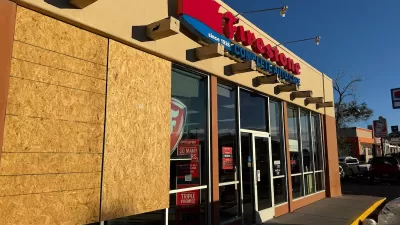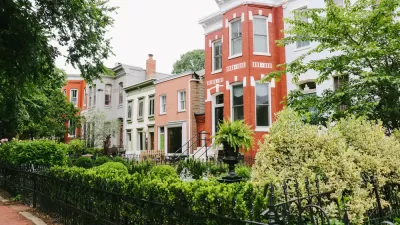As a note of introduction, I am a Master's student in Community Planning at the University of Maryland. I'm happy to be part of this exciting project. With a series of new urban libraries opening in U.S. cities recent years, its been said we're living through an 'urban library renaissance.' Whether it is the enthusiastic reception of the new Seattle library, or lending and attendance up in urban Canadian libraries, there seems to be an increased awareness of the critical role libraries play, even in the information age.However, no such renaissance has happened here in Washington, D.C. -- at least not yet. Here the former mayor's plans to build a new library were stalled by what the Washington Post has termed the 'Mies Mystique.'
As a note of introduction, I am a Master's student in Community Planning at the University of Maryland. I'm happy to be part of this exciting project.
 With a series of new urban libraries opening in U.S. cities recent years, its been said we're living through an 'urban library renaissance.' Whether it is the enthusiastic reception of the new Seattle library, or lending and attendance up in urban Canadian libraries, there seems to be an increased awareness of the critical role libraries play, even in the information age.
With a series of new urban libraries opening in U.S. cities recent years, its been said we're living through an 'urban library renaissance.' Whether it is the enthusiastic reception of the new Seattle library, or lending and attendance up in urban Canadian libraries, there seems to be an increased awareness of the critical role libraries play, even in the information age.
However, no such renaissance has happened here in Washington, D.C. -- at least not yet. Here the former mayor's plans to build a new library were stalled by what the Washington Post has termed the 'Mies Mystique.'
First, some background. Former D.C. Mayor Anthony Williams was an ardent supporter of constructing a new downtown library to replace the system's downtown Martin Luther King Memorial Library, a worn but stately modern structure designed by Mies van der Rohe. Nobody was surprised with a Williams-appointed Blue Ribbon Task Force proposed a new central library several blocks away (on part of the site of the city's old convention center) in their 382-page report issued last November. However, the plan ran afoul with the city's historic preservationists, intent on preserving the only building in Washington designed by architect Mies van der Rohe, and leery of the mayor's plans which call for leasing the structure for offices. The bill to fund a new library didn't make it past committee hearings before the D.C. Council last year and the new mayor Adrian Fenty has been quiet thus far about his plans for the library, which serves as a busy community hub despite chronic heating and cooling problems, leaking pipes, and limited funds. Most recently, the broad coalition of supporters of saving the Mies library have created an online petition.
Mies aside, the library faces bigger problems than deciding on a downtown strategy. The sprawling system operates 27 branches ranging in size from full-sized libraries to a book kiosk, however with years of deferred maintenance the system is badly in need of facilities investment. The library closed 4 of its full-service branches for reconstruction in 2004, but scrapped those plans after the appointment of the Mayor's task force -- leaving the neighborhoods stranded without library service for over two years. Today only one of the four closed locations has a temporary facility installed while the other are served by bookmobiles. Since the appointment of Ginnie Cooper as Chief Librarian last summer, the branch reconstruction program seems to have been accelerated, Sunday hours have been introduced at many location, and the library has introduced free wireless internet.
However, the biggest decision -- what to do downtown -- lingers unresolved.
The image shows the lobby of the Martin Luther King Jr. Memorial Library shortly after it opened in 1972. Photo courtesy DCPL Collection, DC Community Archives, Washingtoniana Division, DC Public Library.

Alabama: Trump Terminates Settlements for Black Communities Harmed By Raw Sewage
Trump deemed the landmark civil rights agreement “illegal DEI and environmental justice policy.”

Planetizen Federal Action Tracker
A weekly monitor of how Trump’s orders and actions are impacting planners and planning in America.

Why Should We Subsidize Public Transportation?
Many public transit agencies face financial stress due to rising costs, declining fare revenue, and declining subsidies. Transit advocates must provide a strong business case for increasing public transit funding.

Understanding Road Diets
An explainer from Momentum highlights the advantages of reducing vehicle lanes in favor of more bike, transit, and pedestrian infrastructure.

New California Law Regulates Warehouse Pollution
A new law tightens building and emissions regulations for large distribution warehouses to mitigate air pollution and traffic in surrounding communities.

Phoenix Announces Opening Date for Light Rail Extension
The South Central extension will connect South Phoenix to downtown and other major hubs starting on June 7.
Urban Design for Planners 1: Software Tools
This six-course series explores essential urban design concepts using open source software and equips planners with the tools they need to participate fully in the urban design process.
Planning for Universal Design
Learn the tools for implementing Universal Design in planning regulations.
Caltrans
Smith Gee Studio
Institute for Housing and Urban Development Studies (IHS)
City of Grandview
Harvard GSD Executive Education
Toledo-Lucas County Plan Commissions
Salt Lake City
NYU Wagner Graduate School of Public Service






























